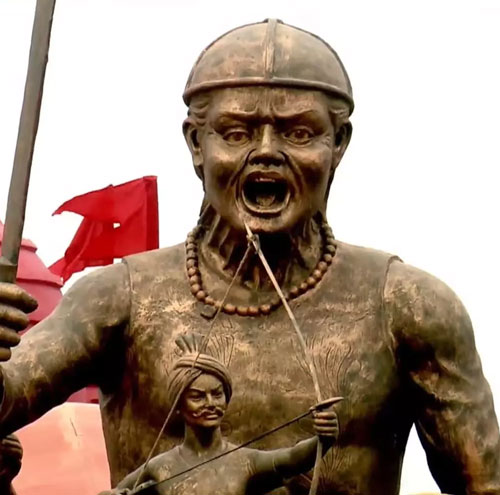Khan Abdul Ghaffar Khan Life History -Biography
Essay on Abdul Ghaffar Khan
Abdul Ghaffar Khan was one of the greatest practitioners of nonviolent resistance and humanitarians of the twentieth century. He has been called the “Frontier Gandhi,” and was known to many as Badshah.
Ghaffar Khan was born in a peaceful and prosperous family in the Peshawar Valley in the year 1890. His early schooling took place at a nearby mosque where he became more and more frustrated that his teachers seemed not to comprehend the nature of religion and emphasised memorisation over understanding.

”Your house has fallen into ruin. Arise and rebuild it and remember to what race you belong.“
After finishing school, the young Ghaffar Khan, upset by the lack of education and rate of illiteracy among his fellow Pashtuns, opened a school to teach children. He got to know and became influenced by the social reformer, Haji Abdul Wahid Sahib, which no doubt expanded and strengthened his feelings and resolve to help his countrymen.
In 1919, Ghaffar was introduced to Mohandas Karamchand Gandhi popularly known as Mahatma Gandhi during protests of the Rowlatt Act. Having found a brother of sorts, Ghaffar Khan would later become part of Gandhi’s inner circle. A result of the action was one of many imprisonments he was subjected to during his long life. But he was resolute in his ideas and determined to act on his beliefs and convictions.
In the 1920s, he joined India’s Congress Party, which expanded its influence to his home area of NWFP. His entrance into politics put him into the movement for the independence of India. In 1921, he was arrested for spreading nationalistic ideas. He was kept, bound, in solitary confinement, and was released in 1924.
In 1929, he helped to establish the Khudai Khidmatgar Movement. The movement (meaning “servants of God”) was a populist-nationalist movement that encompassed his ideas of social reform, unity, independence, and non-violence. Members were organised not unlike an army, with leaders, subgroups and training, but this was an army of unarmed men and women.
Short Note on Abdul Ghaffar Khan
While Gandhi’s movement espoused non-violence and civil disobedience as a policy and as a means to overcome oppression, the non-violence of Ghaffar Khan’s movement was far more at the core of the belief system.
The non-violence he advocated was a matter of deep religious faith that this was the way to live one’s life. He said it “affects all our life, and only that has permanent value” and the movement must be what our name implies—servants of God and humanity-by laying down our own lives and never taking any life”.
In 1946 to 1947, riots and violence broke out, leading up to independence and the partition of India. Gandhi and the party accepted the separation of Pakistan from India. This greatly saddened Ghaffar Khan, as he felt the best course would be a united within Pakistan, itself, or a completely separate state. Again, he was accused of nationalist tendencies and agitation. He continued to be periodically harassed and jailed.
In the years following the partition, he did what he could to continue seeking equality and social reform—when he was not being imprisoned. Pakistan expelled him in 1958. Ghaffar then went to Afghanistan and did not return until the early 1970s.
Khan Abdul Ghaffar Khan died in Peshawar under house arrest in 1988 and was buried in Jalalabad according to his wishes. Although he had been repeatedly imprisoned and persecuted, tens of thousands of mourners attended his funeral, marching through the historic Khyber Pass from Peshawar to Jalalabad.
His eldest son, Ghani Khan was a poet. Another son, Khan Wali Khan is the founder and leader of the Awami National Party and was the leader of the opposition in the Pakistan National Assembly. His third son, Ali Khan was non-political and a distinguished educator, and served as Vice-Chancellor of the University of Peshawar.





